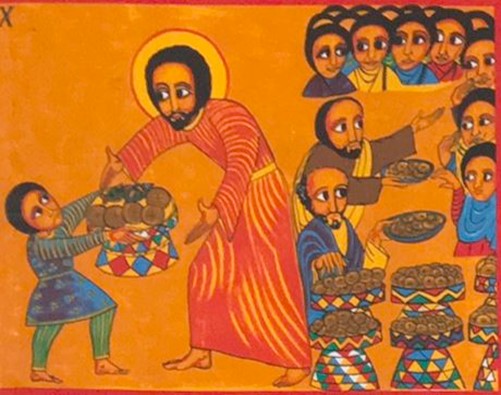Scripture:
2 Kings 4:42-44
Ephesians 4:1-6
John 6:1-15
Reflection:
There is a boy here who has five barley loaves and two fish;
but what good are these for so many? ~John 6:9
In today’s readings, I’m struck by the fact that this miracle of abundance, this wondrous multiplication of the loaves and feeding of the five thousand (not including women and children!), begins with a boy who has five loaves and two fish. A child.
The adults in the situation—the disciples who are with Jesus day in and day out, and might have perhaps by this point developed some trust in Jesus’ abilities—are flustered. One might even imagine panicked. “Where can we buy enough food?” “It would take two hundred days’ wages!” “What good are these for so many?” I think of the many times I have looked to my own resources for solutions, unaware of Jesus ever ready to work miracles.
But Jesus simply receives the boy’s gifts. And in striking similarity to the Last Supper and Eucharist, he “took the loaves, gave thanks [eucharistēsas in Greek], and distributed them.” And all who were there, every last man, woman, and child received their fill.
Theologian Walter Brueggemann observes that many of us are habituated to a “market ideology [that] wants us to believe that the world is profane—life consists of buying and selling….But Jesus presents an entirely different kind of economy, one infused with the mystery of abundance and a cruciform kind of generosity.”[1] A market ideology draws us into an economy of scarcity undergirded by fear, and competition with our neighbor. In the mystery of abundance, incredible numbers of people are fed with food left over. And, not only that, we can also imagine that the crowd included folks from all different social and economic groups—at a time when social barriers to table fellowship were strictly upheld. This is a scene of both miraculous abundance and radical inclusiveness.
So I wonder, what are the situations today where we adults may be, like the disciples, blindly limited by our stubborn clinging to our own resources and habitual ways of thinking, oblivious to Jesus in our midst? It may seem like a bit of a jump, but I wonder if Greta Thunberg, the young climate activist, the Parkland teenagers who sparked the #NeverAgain movement, or Malala Yousafzai, the 15 year old shot in the head by the Taliban in Pakistan for daring to speak out against a ban on education for girls, are very different from the boy in John 6:9. These young people offer what they have: a sign reading “Skolstrejk för klimatet” and time every Friday; the experience of surviving a school massacre and the determination that it not happen to another young person; the courage to speak up for the rights of girls in the face of an oppressive state.
And, even as the adults on the scene seem to be in disarray, Jesus receives their gifts, gives thanks, and offers them to all. Over time, we have seen the gifts of each of these children miraculously multiplied—even in the face of hate and violence—into movements larger than themselves with a vision toward abundance, healing and radical inclusivity. A “cruciform kind of generosity”, indeed. May the Passion of Jesus Christ be always in our hearts.
[To read more stories of young people who are offering their gifts, visit: https://www.washingtonpost.com/kidspost/2020/04/11/12-kids-who-are-changing-their-communities-our-world/.]
Lissa Romell is the Administrator at St. Vincent Strambi Community in Chicago, Illinois.
[1]The Liturgy of Abundance, the Myth of Scarcity: Consumerism and Religious Life by Walter Brueggemann [https://sanantonioreport.org/wp-content/uploads/2016/09/the_liturgy_of_abundance.pdf].

